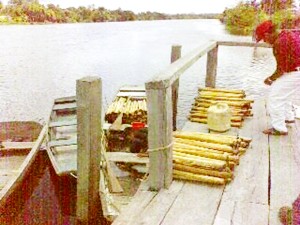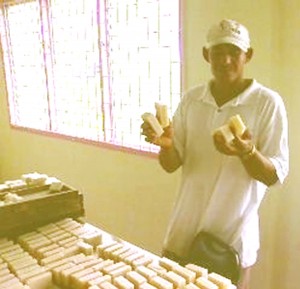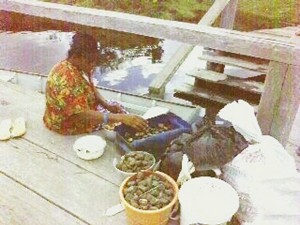Berbice River farmers are moving away from traditional farming and delving into harvesting the heart-of-palm fruit and crabwood seed oil production as an alternative source of income as continual rainfall and flooding prevent them from cultivating their lands.

Despite its vast agriculture potential residents say they have been forced to leave their traditional source of income as Wiruni Captain Rohan Fredricks told Stabroek News recently that the river is “the highest that I have ever seen the water,” in 40 years. The man said that rain has prevented farming in his community which is 106 square miles and has a population of over 500 but he and 28 other farming families are supplementing their incomes by making crabwood seed oil and soaps. Eight families are involved in making the soaps and 20 families produce the oil. Both products are sold to the Guyana Marine Turtle Conservation Society (GMTCS).
A few months ago the families began selling their products and Fredricks noted that “it helping a lot.” The families had been selling about 87 gallons of oil per month for the past two months, to the GMTCS. He said they also have over 100 gallons of oil in stock. One gallon of the oil costs $8,000 he said. Several residents have turned to this business to supplement their income. Wiruni resident Francis Wilson, for instance, cultivates a kitchen garden but he sells the extra produce. He also rears chickens. Wilson told this newspaper that he would like to sell the five gallons of oil he has to supplement his pension.

Barters
Meanwhile heart-of-palm or manicole harvester Lennox Eastman said he barters the fruit for food items at Ebini. Farmers can chose between cash and food items. Eastman said with the “rising price for things you gotta cut cabbage (heart-of-palm)…to brace yourself.” The man has five acres of farm land in the savannahs, where he plants peas and nuts as it is “very difficult” right now living in the river. He said the wholesale price for the peas fluctuates and the cost of fertilizer adds to this strain. Eastman said too the transportation cost to take his produce to New Amsterdam (NA) is not adequate compensation.
A weekly private boat that operates on Saturdays charges $300 per bag for any produce for transport to New Amsterdam and this excludes the farmer’s passage. So harvesting the heart-of-palm, “it’s a way of survival” he said added that the fruit is graded with the highest grade valued at $22, an increase from a few years ago, and the lowest at $5. One pensioner said that, “farming is hard,” explaining that only two weeks of sun had been evident for the year in March. He said it has rained since then and this reporter experienced first-hand the continual rainfall and was drenched during the return trip. The pensioner said she gets assistance from her children together with the pigs, cows and whatever little the farm produces. Since it is difficult to leave the community to purchase food items, due to the high transportation cost she said she would buy from the retail boats in the river though “they nah reasonable.”

However, the boat retailers have argued that the retail prices are determined by the cost. One pound of sugar retails for about $90, a gallon of white rice from $900 to $1,000, one pound of milk $800, one gallon of kerosene oil $980 and gasoline is around $1,400 per gallon. The woman said in order to shop in NA, it would take 10-12 gallons of gasoline from her location or a passage of about $3,000. To cut costs for such trips three or four persons would sometimes pool their money to buy gasoline.
Meanwhile, one sawmill in the area began selling sawn lumber which he believes will be profitable. Lumber yard owner Glendon Gladstone, of Double G and Sons Sawmill at Sandhill employs about five persons at his operation, which started two years ago. Currently, his equipment comprises a small wood-plane but he plans to upgrade to a full scale sawmill for which he plans to hire 15 persons. Gladstone believes that his business will be profitable and he was able to secure bank financing to purchase capital equipment for his operation. Nevertheless, the man said he is not expecting to see a large profit until the next three years. At the moment, the major cost of the operation is fuel which is about $50, 000 for a 45-gallon drum. Sawn lumber from Double G is sold to New Amsterdam – to communities in the river and further afield.

More planting material
Even though only a small quantity of farming is being done in Wikki, Calcuni due to the high levels of rainfall, the captain of that village still would like to receive more planting supplies for his community.
While Stabroek News was in the area Region 10 Chairman Mortimer Mingo was making his quarterly rounds along the Berbice River and had shared corn grains for cultivation. At a meeting at Wikki, Calcuni the village captain said that on daily radio broadcasts persons are urged to grow more food yet adequate quantities of seed are not provided. “To bring a little bit of seeds like this it do not encourage you to farm,” he said.
In response, Mingo said the National Agricultural Research Institute (NARI) had provided the grains for the region after it had made representation for same. NARI provided a 50kg bag of the grains for distribution along the Berbice River. The captain had said that some months ago Amerindian Affairs Minister Pauline Sukhai had also brought some seeds, but that too was also a small quantity. Half the 200 plus population at Wikki are either teenagers or younger.
Meanwhile, Mingo told the meeting that the New Guyana Marketing Corpora-tion (GMC) was expected to start selling rice, flour and sugar at reduced prices in the riverain communities of Region 10. These include Upper Demerara, Ituni, Kwakwani and the Berbice River.
The chairman noted residents had made representation for the items to be sold there as had been done in other areas of the country. Mingo said each household would be allowed to buy $3,000 in food items that is, 3kg of flour at $150 per kg, 3kg of sugar at $110 per kg, two gallons of white rice at $530 per gallon and 2 gallons of brown rice at $800 per gallon. When this newspaper told Eastman about the items he said, “da gon be nice, very, very nice.”





